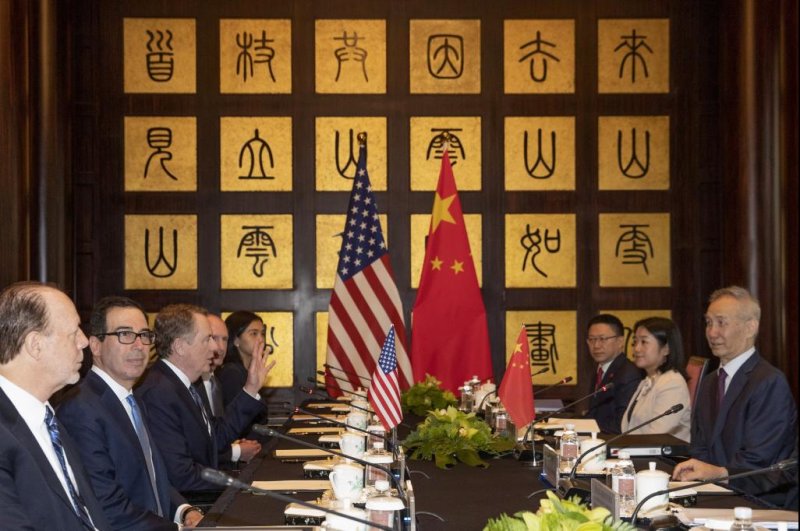Chinese Vice Premier Liu He (R), U.S. Trade Representative Robert Lighthizer (3-L) and Treasury Secretary Steve Mnuchin (2-L) meet in Shanghai on Wednesday. Photo by Ng Han Guan/EPA-EFE
July 31 (UPI) -- New trade talks between the United States and China ended Wednesday with small signs of progress that could indicate potential to end the long-running trade conflict.
U.S. Treasury Secretary Steven Mnuchin and trade chief Robert Lighthizer met with Chinese Vice Premier Liu He in Shanghai for the first round of trade talks between the nations in two months.
There were signals of nominal progress. China agreed at the talks to buy more agricultural products from the United States, and called the discussions "frank, efficient and constructive." The United States agreed to provide "favorable" conditions for imports.
The renewed talks were accompanied by little fanfare, but some hoped the low-key gathering might inspire signs of progress. The trade conflict between Washington and Beijing is now in its second year.
The U.S. and Chinese leaders agreed to meet again in September, possibly in the United States. U.S. President Donald Trump and Chinese President Xi Jinping also said last month they'd agreed to more talks.
"The two sides discussed topics such as forced technology transfer, intellectual property rights, services, non-tariff barriers, and agriculture," the White House said Wednesday. "The meetings were constructive, and we expect negotiations on an enforceable trade deal to continue in Washington, D.C., in early September."
Some experts say China is in no hurry to make new trade concessions, as fears over the new U.S. tariffs have subsided -- mainly because the resulting economic harm has been less than expected. Analysts say Beijing is also closely watching the 2020 presidential race to see how it may affect U.S.-China trade.
"If Trump is re-elected, he may face less election pressure and negotiations may be less tough," international relations expert Pang Zhongying, of China's Ocean University, told the South China Morning Post.
"Right now, the most important thing for Trump is the election," added former Chinese commerce official Wei Jianguo.
Some expressed concern when Trump slammed China in a series of tweets Tuesday before the talks began, accusing Beijing of stalling and ripping off the United States in past dealings.















